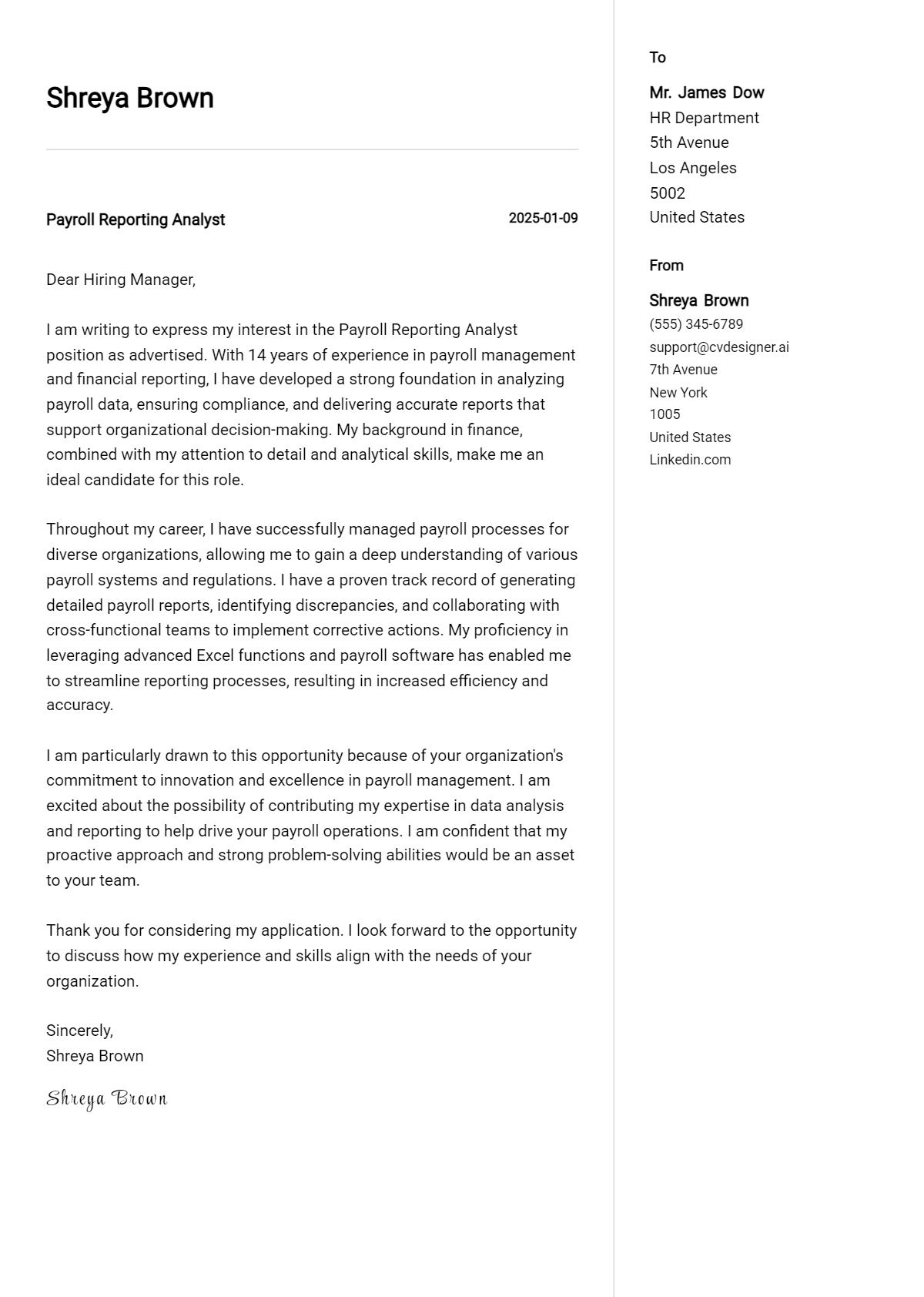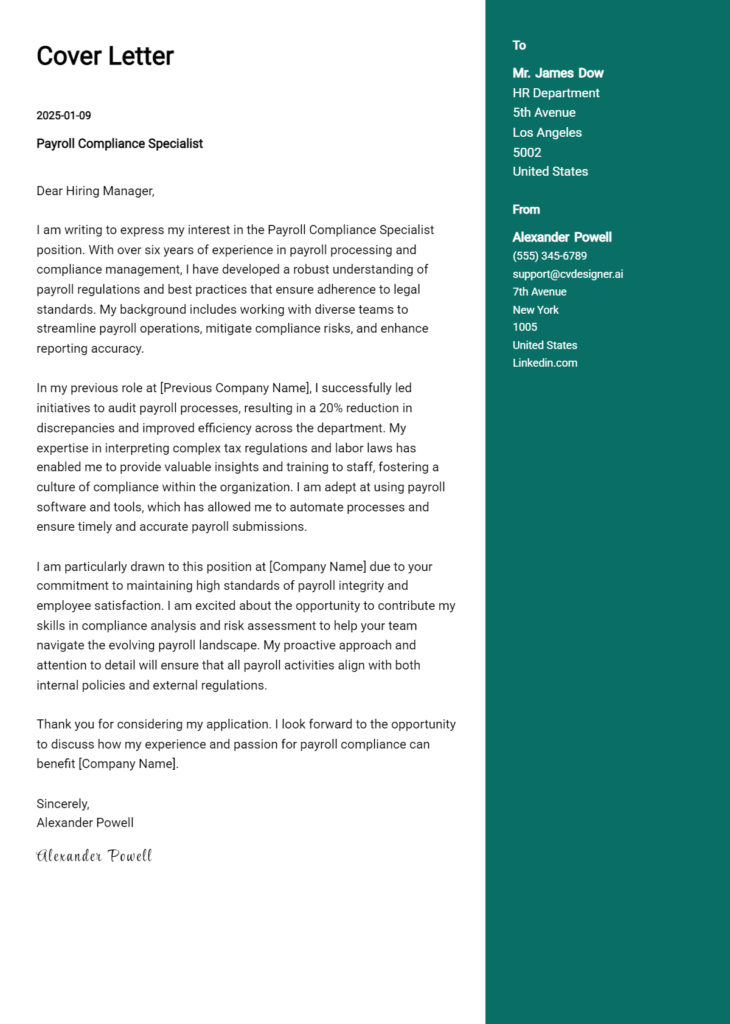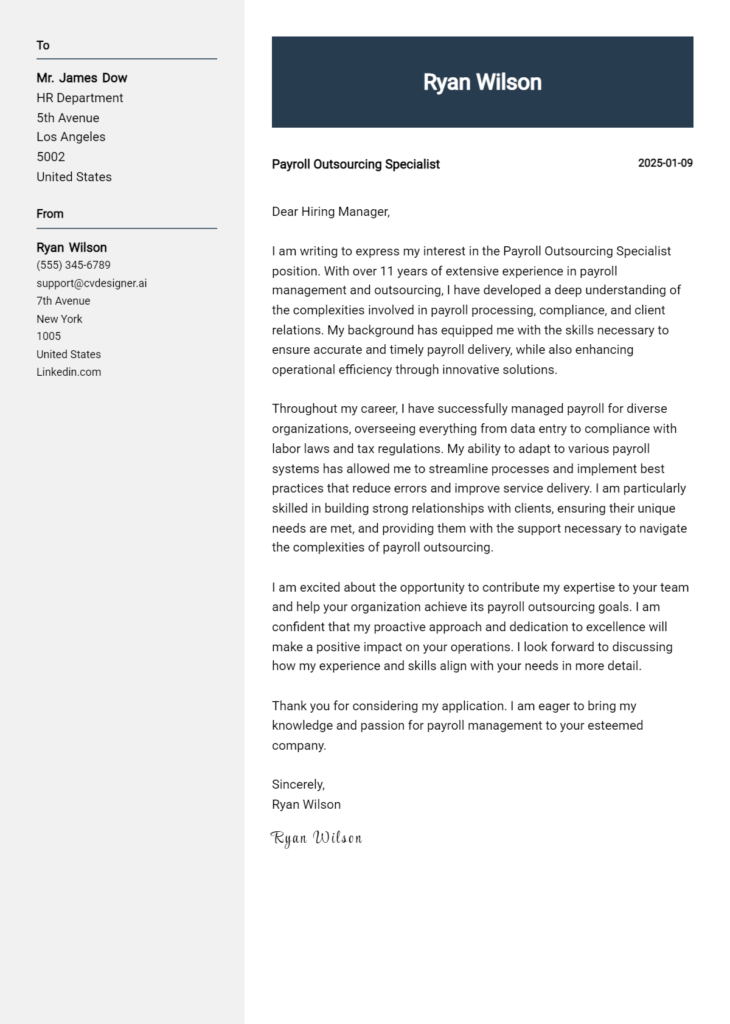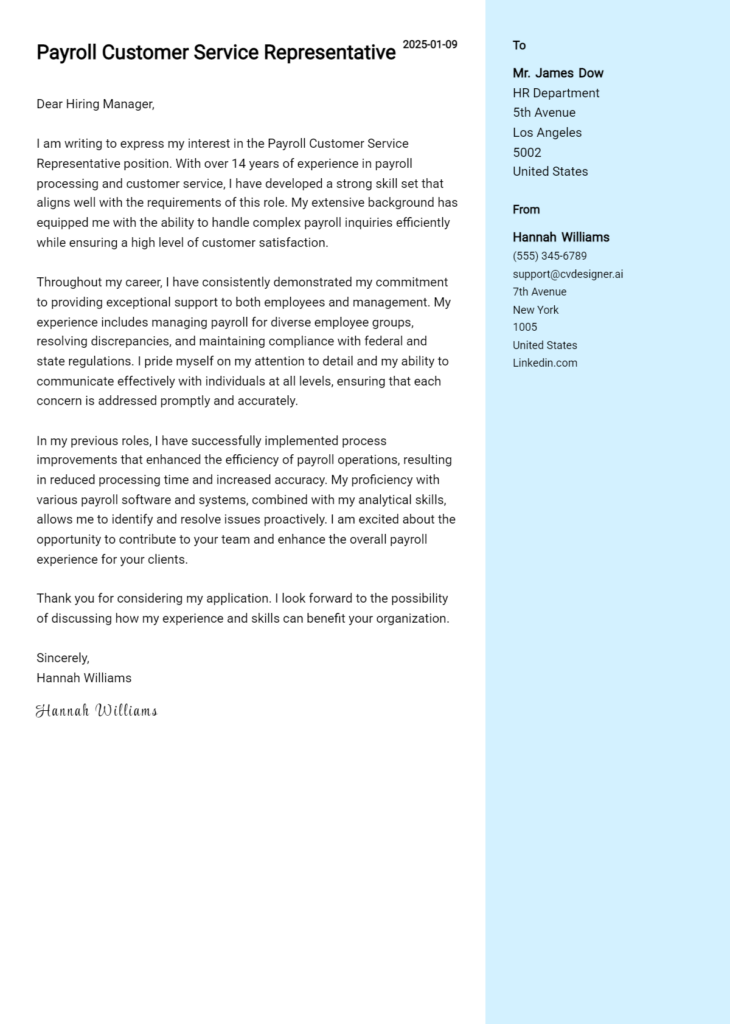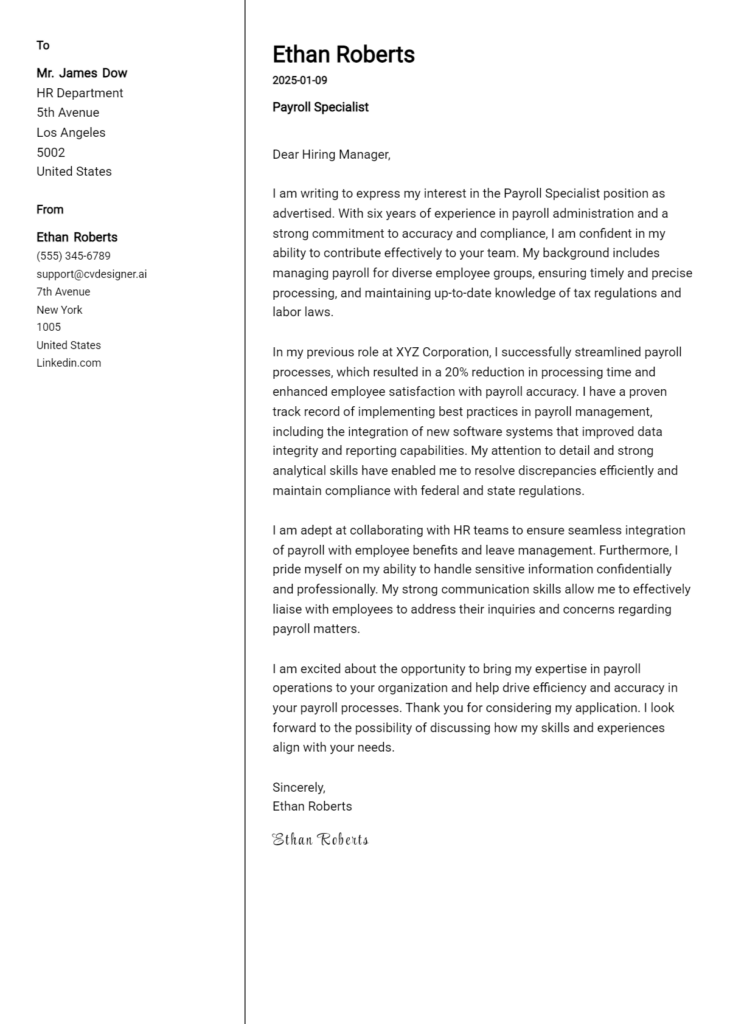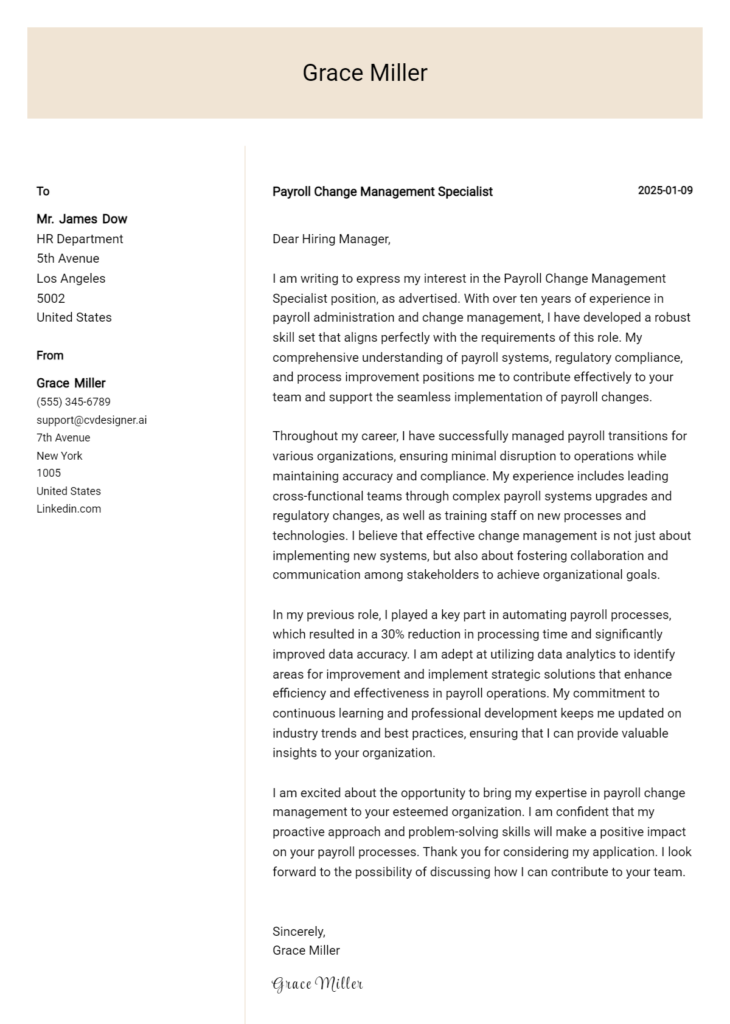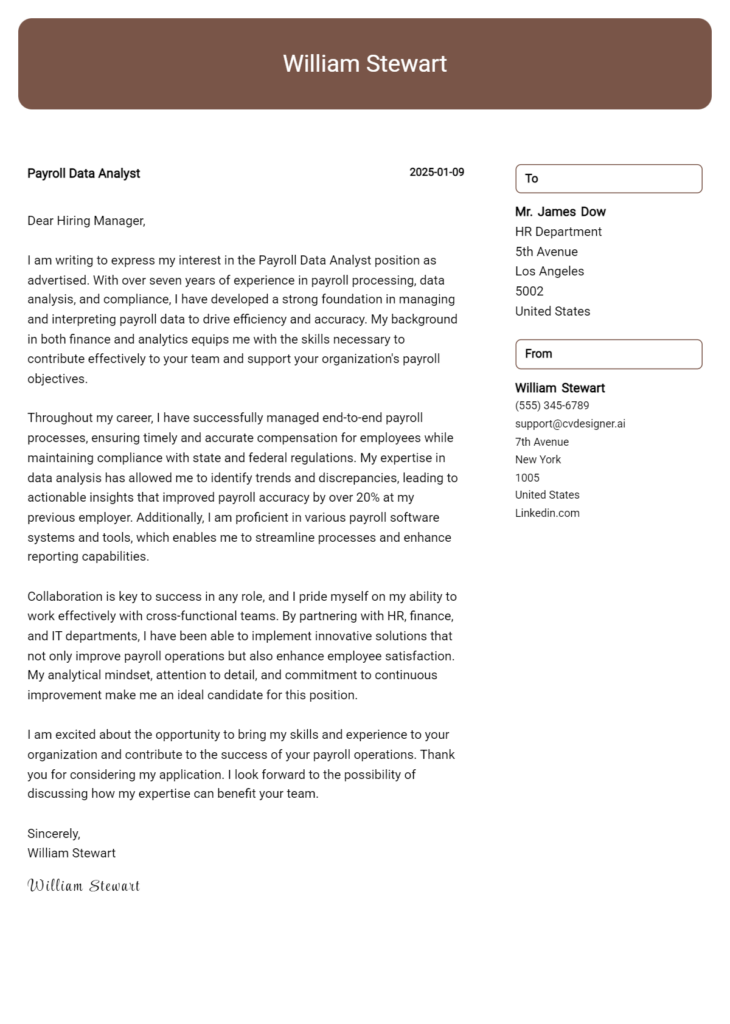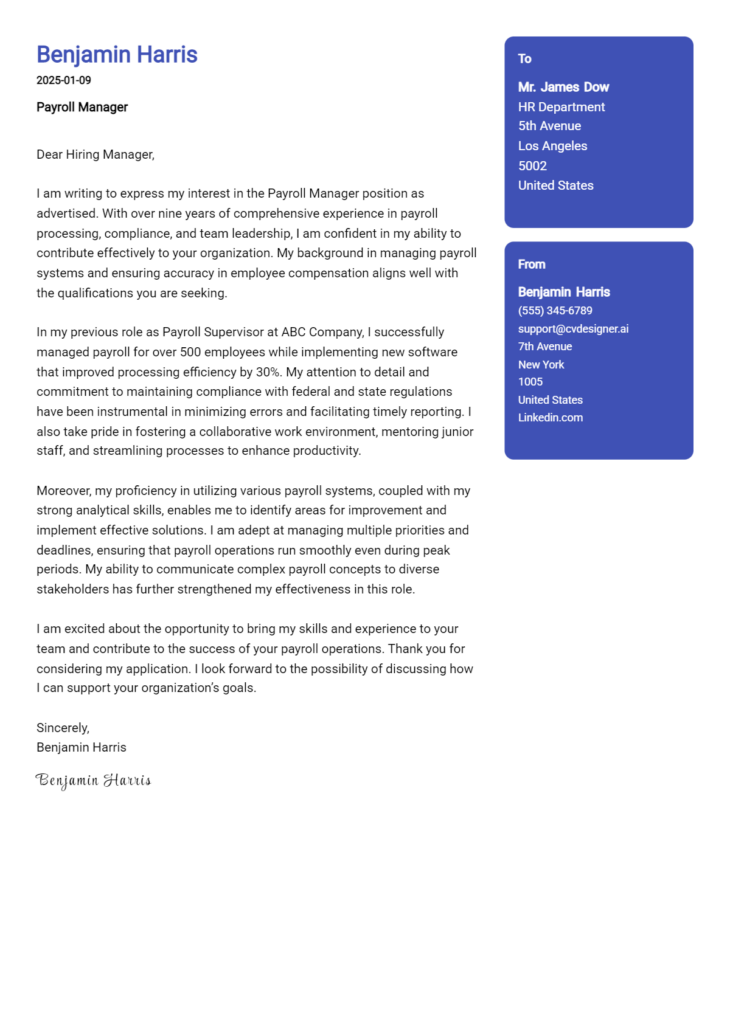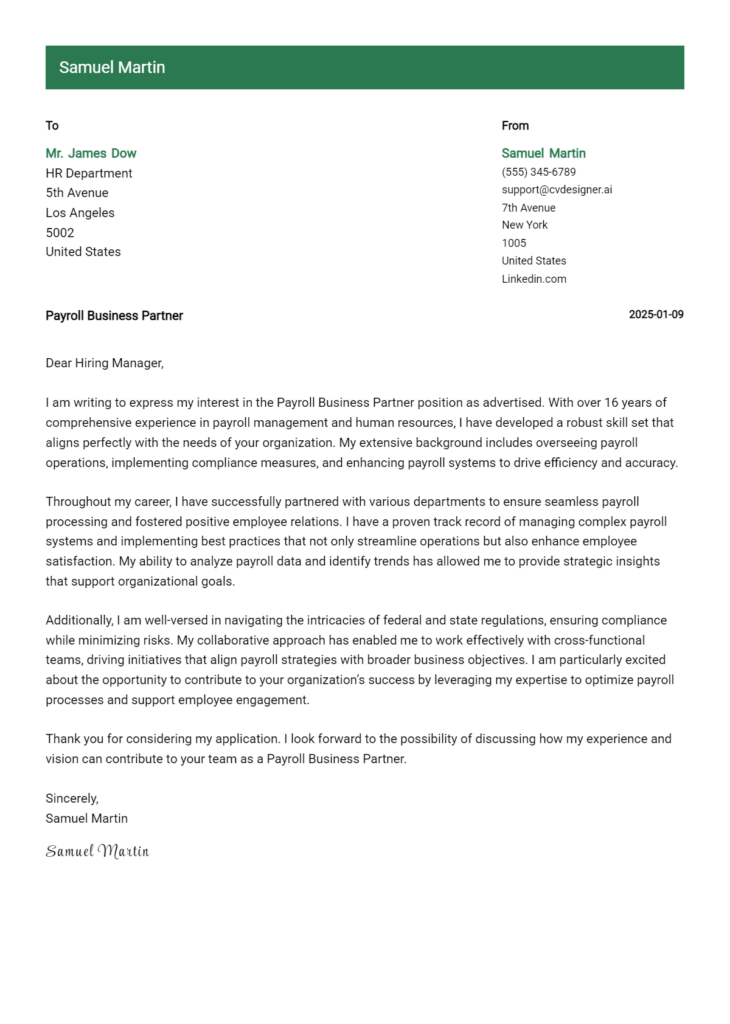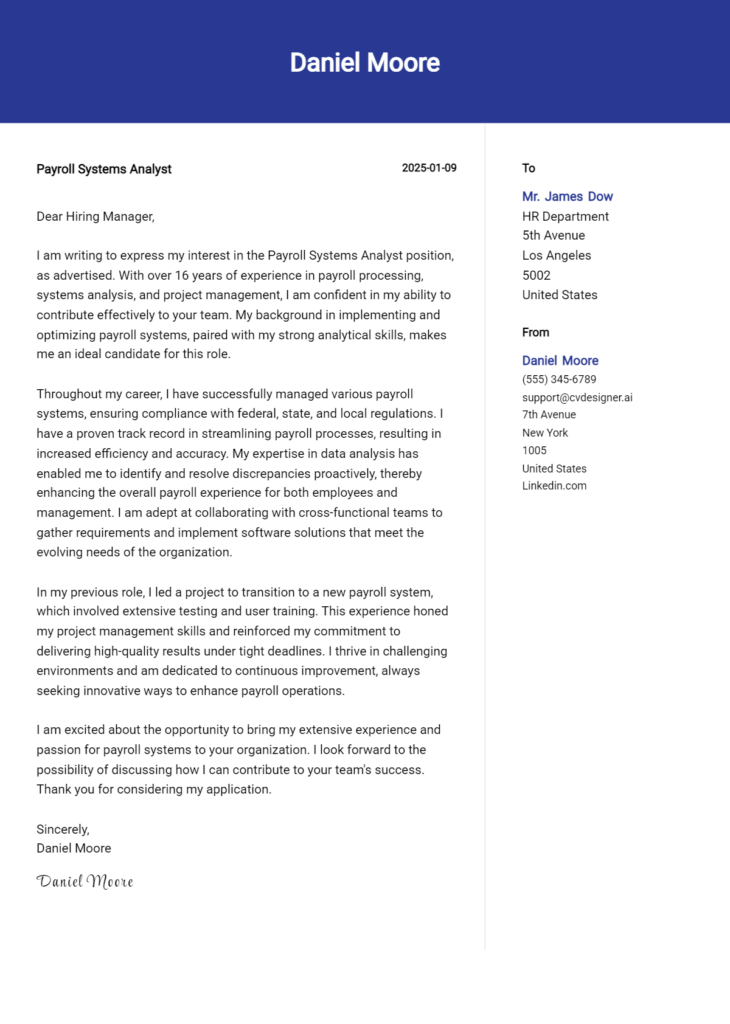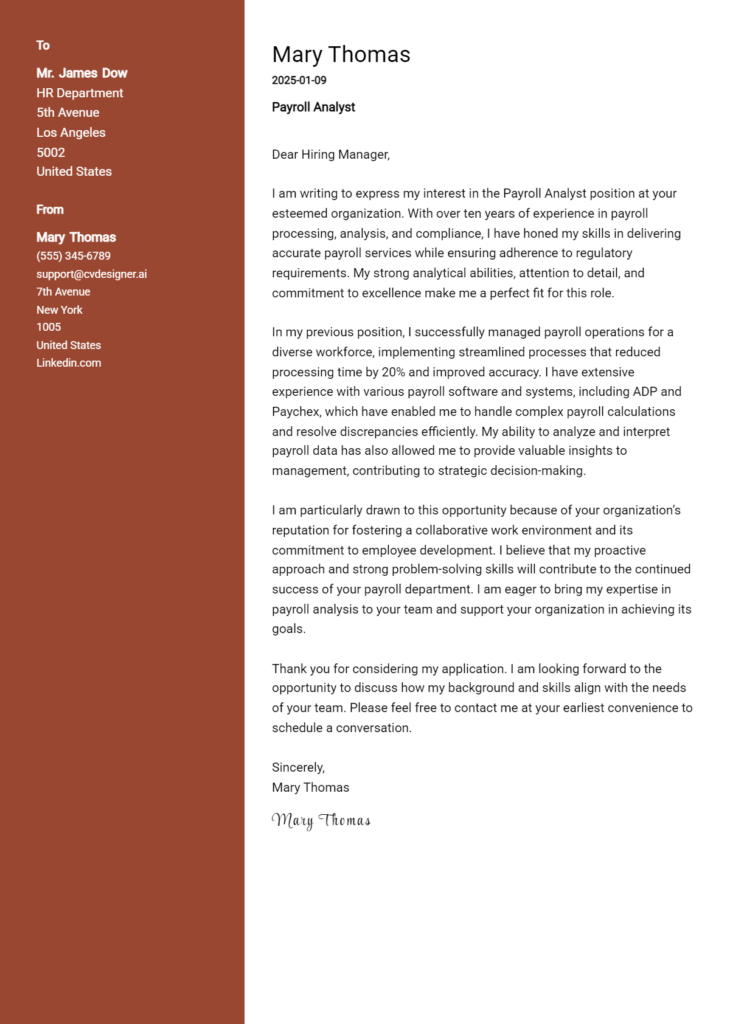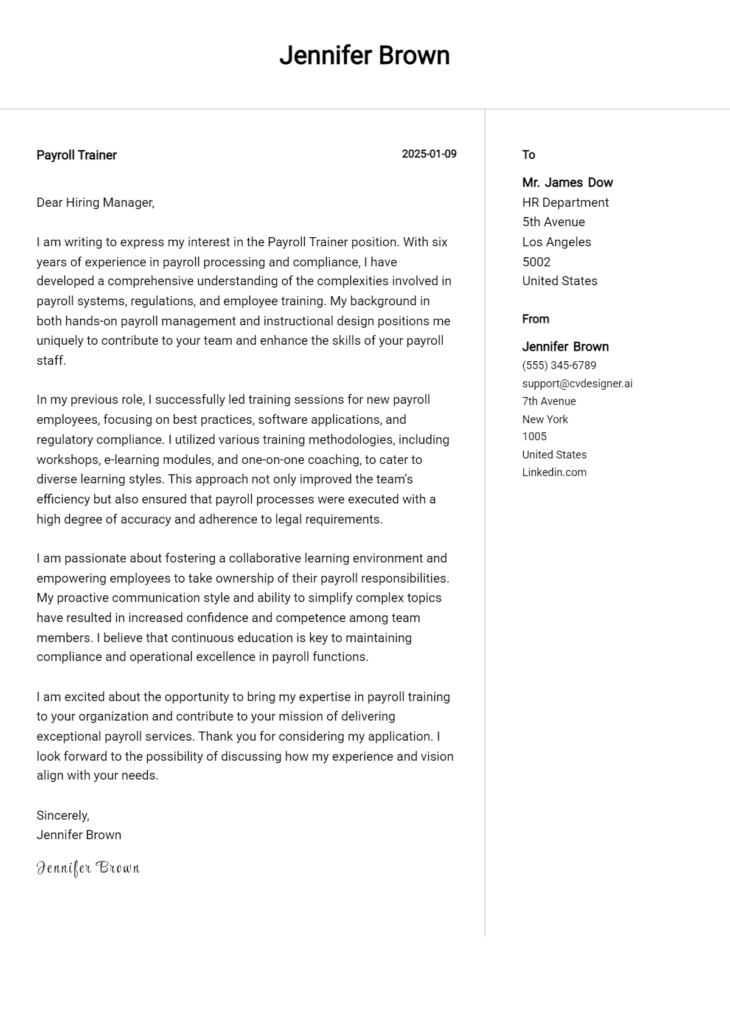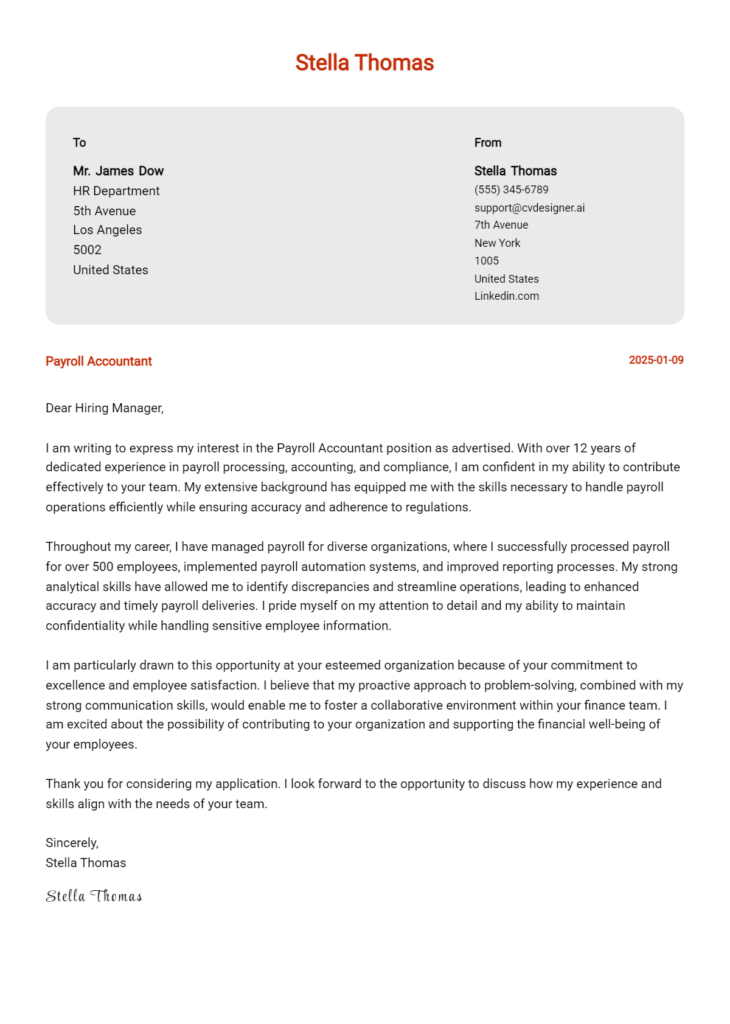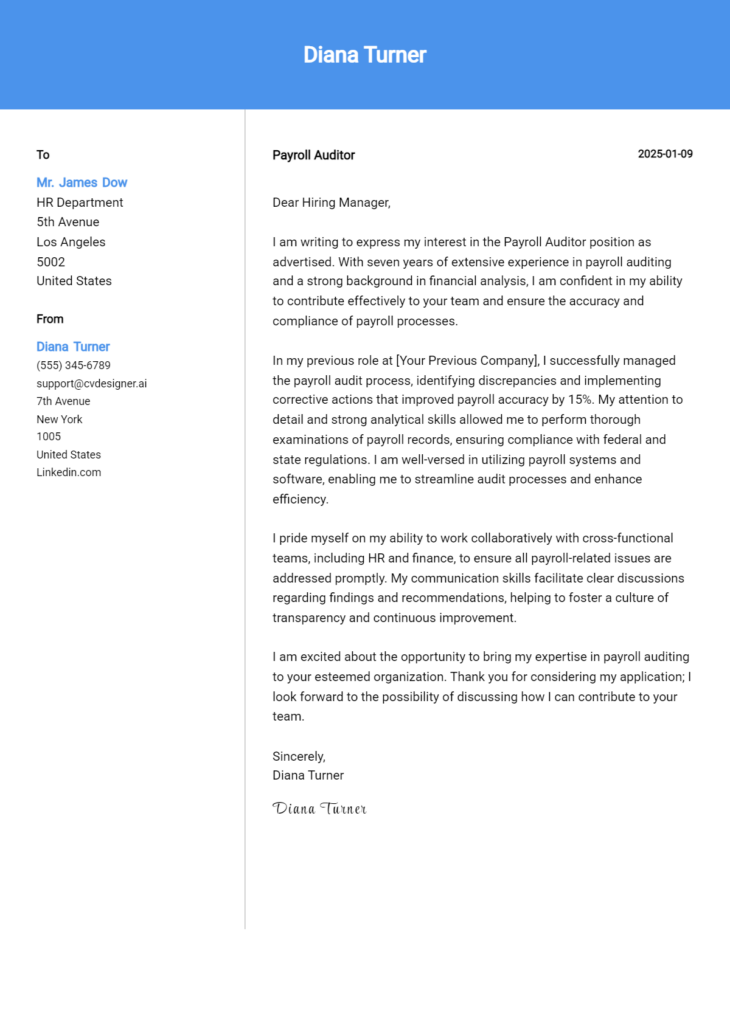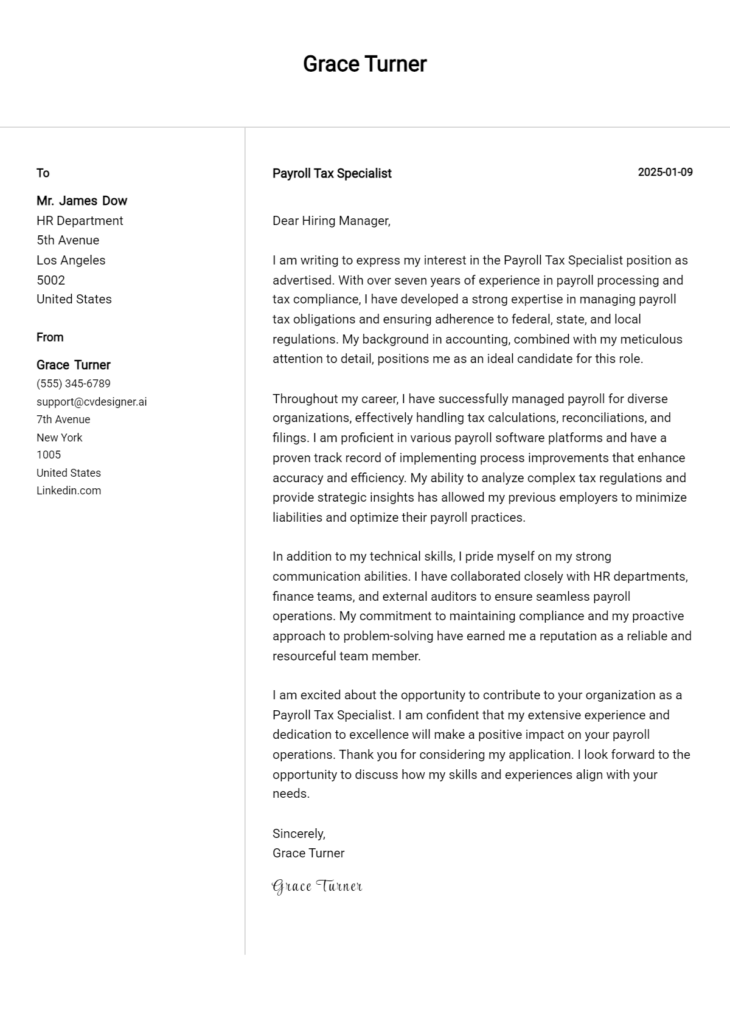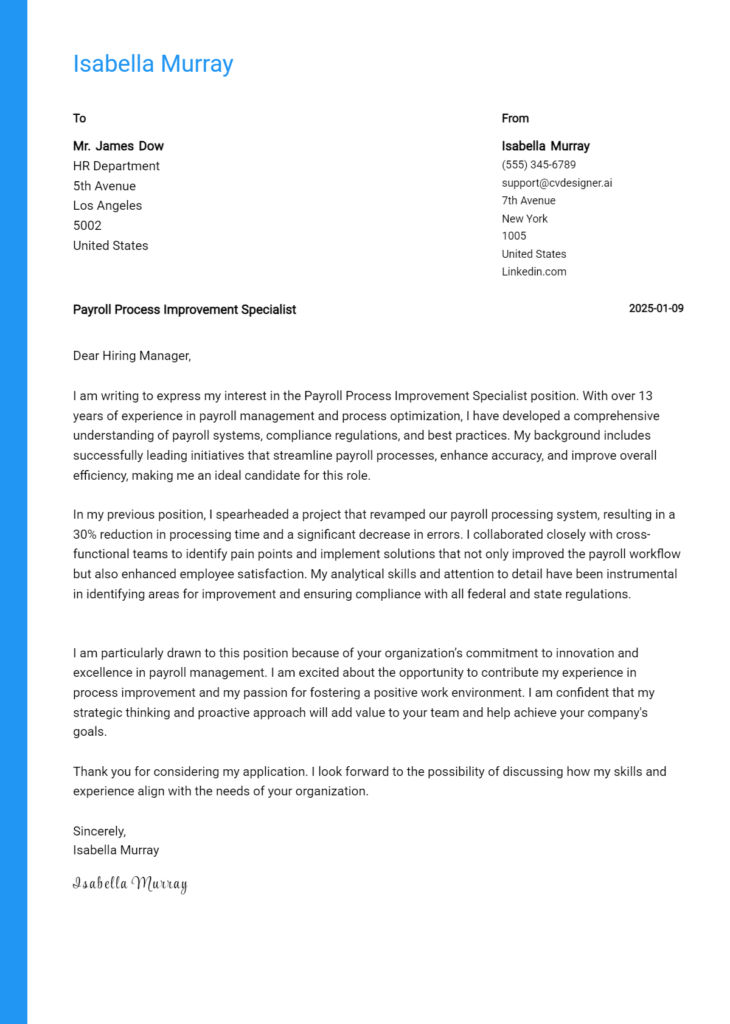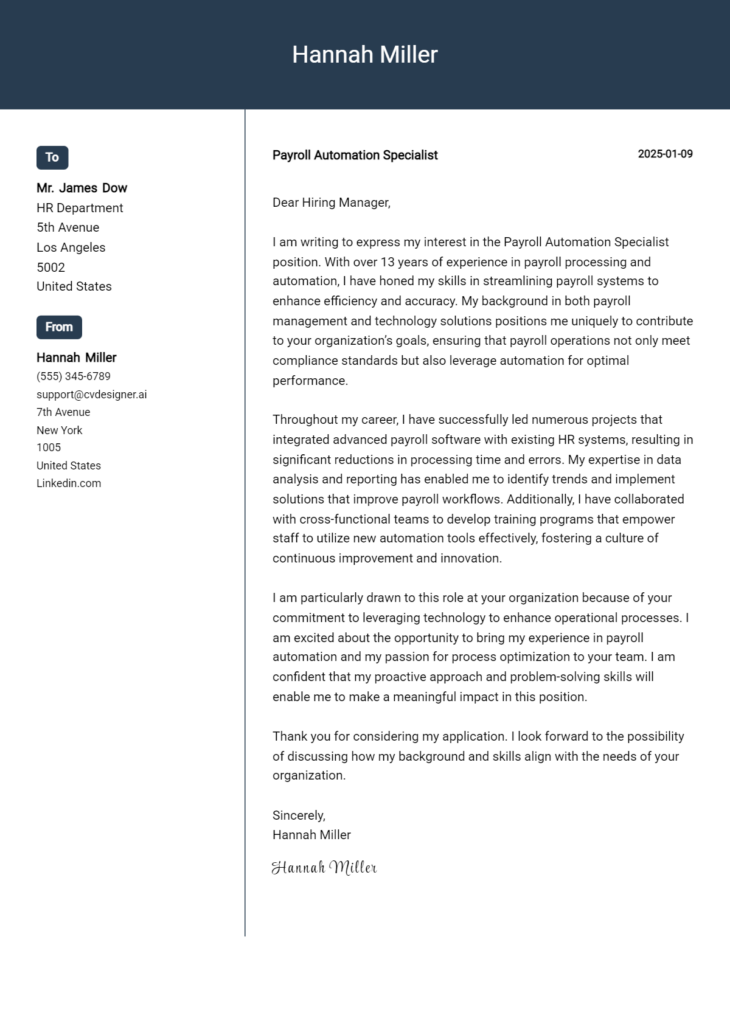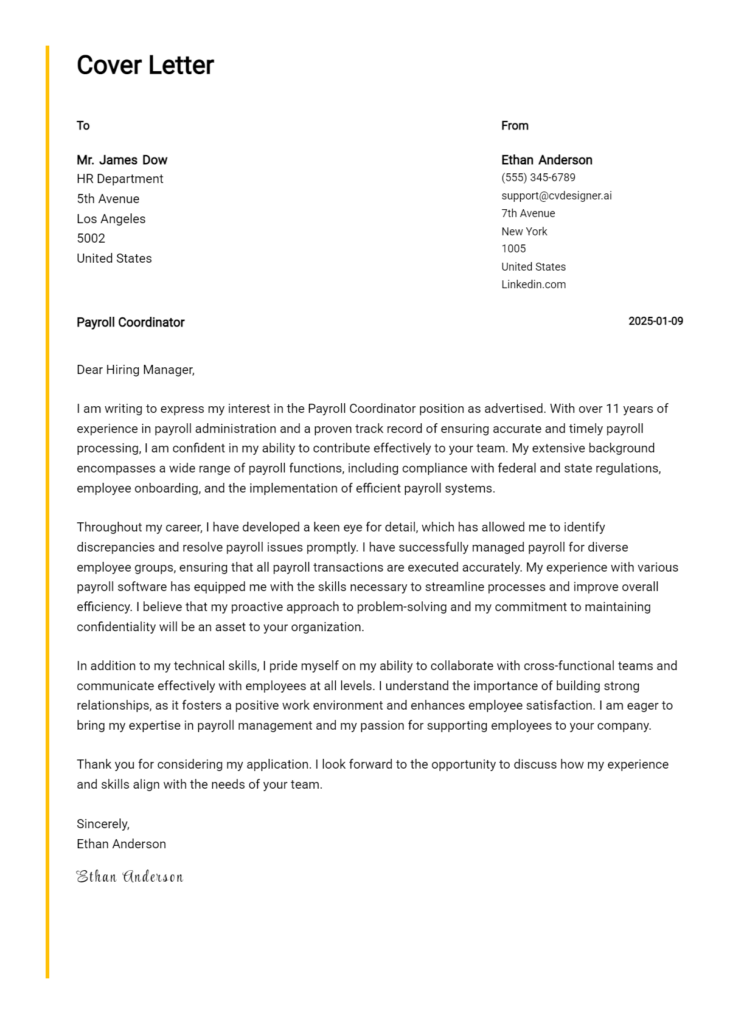Payroll Reporting Analyst Cover Letter Examples
Explore additional Payroll Reporting Analyst cover letter samples and guides and see what works for your level of experience or role.
How to Format a Payroll Reporting Analyst Cover Letter?
Crafting a well-formatted cover letter is essential for a Payroll Reporting Analyst, as it serves as your first impression to potential employers. A meticulously structured cover letter not only highlights your relevant qualifications but also demonstrates your analytical skills and attention to detail—qualities that are vital in the payroll and reporting landscape. The organization of your cover letter can effectively capture the hiring manager's interest while showcasing your ability to manage complex data and adhere to compliance standards.
In this guide, we will outline how to structure your cover letter, providing insights and examples tailored specifically for payroll reporting roles.
We will focus on the essential components of a professional cover letter, including:
- Cover Letter Header
- Cover Letter Greeting
- Cover Letter Introduction
- Cover Letter Body
- Cover Letter Closing
Each section plays a critical role in presenting your qualifications and professionalism. Let’s delve into each part to help you create a standout cover letter for your Payroll Reporting Analyst application.
The Importance of a Cover Letter Header for a Payroll Reporting Analyst
A well-structured cover letter header is crucial for a Payroll Reporting Analyst as it sets the tone for the entire application. Clarity and professionalism are key, as this role demands precision and attention to detail. The header should include the applicant's contact information, the date, and the recipient's details, ensuring that the hiring manager can easily reach out and identify the correspondence. A strong header reflects the applicant's organizational skills and can make a lasting impression.
Strong Example:
John Doe 123 Finance St. Payroll City, ST 12345 (123) 456-7890 john.doe@email.com March 15, 2023 Jane Smith Hiring Manager XYZ Corporation 456 Business Rd. Corporate Town, ST 67890
Weak Example:
Hey, My Name Is John, March 15, 2023 To Whom It May Concern,
The Importance of a Strong Cover Letter Greeting
The greeting of your cover letter serves as the first impression and sets the tone for the rest of your application. A well-crafted greeting demonstrates professionalism and personalizes your approach by addressing the hiring manager directly. This personal touch can create a more favorable perception of your application, making it clear that you have taken the time to research and tailor your submission. To avoid generic greetings that may come off as impersonal or lazy, take the time to find out the name of the hiring manager or recruiter. This small effort can differentiate you from other candidates.
When addressing the recipient, opt for a warm and professional tone. Here are examples of strong and weak greetings for a Payroll Reporting Analyst cover letter:
Strong Greeting Example
Dear Ms. Johnson,
Weak Greeting Example
To Whom It May Concern,
The Importance of a Strong Cover Letter Introduction for a Payroll Reporting Analyst
A well-crafted cover letter introduction is crucial for capturing the attention of a hiring manager, especially for a specialized role like a Payroll Reporting Analyst. This opening paragraph sets the tone for the entire application and serves as a first impression. It should express genuine interest in the position while briefly highlighting relevant skills and achievements that demonstrate the candidate's qualifications. An effective introduction not only piques the reader's interest but also establishes a connection between the candidate's experience and the requirements of the job.
Strong Example
Dear [Hiring Manager's Name], I am excited to apply for the Payroll Reporting Analyst position at [Company Name]. With over five years of experience in payroll processing and data analysis, I have developed a keen eye for detail and a passion for accuracy that I believe will significantly contribute to your team. My recent role at [Previous Company] allowed me to streamline payroll reporting processes, reducing discrepancies by 30%, which directly enhanced overall organizational efficiency. I am eager to bring my expertise to [Company Name] and support your commitment to excellence in payroll management.
Weak Example
To whom it may concern, I am writing to apply for the Payroll Reporting Analyst job. I have done some payroll work before and think I could do well in this position. I have a degree in Business and some experience with numbers. I hope to hear back from you soon.
Purpose of the Cover Letter Body for a Payroll Reporting Analyst
The cover letter body for a Payroll Reporting Analyst serves as a critical opportunity for candidates to articulate their relevant skills, experiences, and the unique value they bring to the organization. It is the section where applicants can delve into specific projects or accomplishments that demonstrate their expertise in payroll analysis, reporting, and compliance. By providing quantifiable achievements—such as improving reporting accuracy by a certain percentage or leading a successful payroll system implementation—candidates can effectively showcase their ability to contribute to the company's financial integrity and operational efficiency. A well-crafted cover letter body not only conveys technical competencies but also reflects the candidate’s enthusiasm for the role and alignment with the company’s goals.
Strong Example
I am excited to apply for the Payroll Reporting Analyst position at XYZ Corporation, where I believe my extensive background in payroll processing and reporting can contribute significantly to your team. In my previous role at ABC Company, I led a project that streamlined our payroll reporting process, resulting in a 30% reduction in processing time and increasing accuracy in data reporting by 15%. Additionally, I implemented a new reporting tool that enhanced our ability to track and analyze payroll data, which was instrumental in achieving compliance with new regulatory requirements. I am eager to bring my analytical skills and proactive approach to XYZ Corporation, further enhancing your payroll operations.
Weak Example
I want to apply for the Payroll Reporting Analyst job. I have done some payroll work in the past, and I think I can do it well. I am familiar with some reporting tools and have worked on payroll before. I hope to help your company with its payroll needs.
Importance of the Cover Letter Closing for a Payroll Reporting Analyst
The closing paragraph of a cover letter is crucial for leaving a lasting impression on the hiring manager. It should summarize your qualifications, reiterate your enthusiasm for the role, and encourage the reader to take the next steps—such as reviewing your resume or scheduling an interview. A strong closing can effectively reinforce your fit for the position and motivate the employer to engage with you further, while a weak closing may leave a less favorable impression and diminish your chances of being considered for the role.
Strong Example
Thank you for considering my application for the Payroll Reporting Analyst position. With my extensive experience in payroll processing and data analysis, combined with my passion for ensuring accuracy and compliance, I am excited about the opportunity to contribute to your team. I look forward to the possibility of discussing how my skills align with your needs. Please feel free to review my attached resume and contact me to schedule an interview at your convenience.
Weak Example
I hope you think my application is okay. I have experience in payroll stuff and would like to talk more. If you want to, you can look at my resume. Thanks for your time.
These tips will help candidates craft an effective cover letter for a Payroll Reporting Analyst position. A well-written cover letter is essential for showcasing your qualifications and demonstrating your fit for the role. As a Payroll Reporting Analyst, it's crucial to highlight your technical skills, problem-solving abilities, knowledge of the Software Development Life Cycle (SDLC), teamwork experience, and a passion for continuous learning to stand out from other applicants.
Cover Letter Writing Tips for Payroll Reporting Analyst
Emphasize Technical Skills: Clearly outline your technical expertise in payroll systems, data analysis tools, and reporting software. Mention specific programs (like SAP, ADP, or Excel) you are proficient in, and include any relevant certifications. Providing tangible examples of how you've utilized these tools to improve payroll processes or reporting accuracy can strengthen your case.
Showcase Problem-Solving Abilities: Use your cover letter to narrate instances where you've successfully identified and resolved complex payroll issues. Detail the steps you took, the rationale behind your decisions, and the positive outcomes that followed. This not only highlights your analytical skills but also demonstrates your proactive approach to challenges.
Highlight SDLC Knowledge: If you have experience working within the Software Development Life Cycle, be sure to mention it. Discuss your involvement in any projects related to payroll software implementation or enhancement. Explain your understanding of each SDLC phase, particularly how it relates to payroll reporting and analysis, to show your comprehensive knowledge of the field.
Illustrate Teamwork Experience: Payroll reporting often requires collaboration with HR, finance, and IT departments. Share examples of how you've effectively worked in teams to achieve common goals. Highlight your communication skills and ability to foster positive relationships, emphasizing how this collaboration has led to improved payroll processes or reporting accuracy.
Express Passion for Continuous Learning: Convey your enthusiasm for ongoing professional development. Mention any relevant courses, workshops, or certifications you've pursued to stay updated with the latest payroll regulations, technologies, or reporting practices. This shows potential employers that you are committed to your career growth and are adaptable in a constantly evolving field.
Common Mistakes to Avoid in a Payroll Reporting Analyst Cover Letter
Crafting an effective cover letter is crucial for standing out in a competitive job market, especially for a Payroll Reporting Analyst position. Many candidates make common mistakes that can undermine their chances of success. Here are some pitfalls to avoid:
Generic Greetings: Using "To Whom It May Concern" can make your letter feel impersonal. Instead, research the hiring manager's name and address them directly.
Lack of Specificity: Failing to mention specific skills or experiences related to payroll reporting can weaken your application. Tailor your letter to highlight relevant qualifications and achievements.
Overly Complex Language: Using jargon or convoluted sentences can obscure your message. Aim for clarity and conciseness to effectively communicate your skills.
Neglecting Formatting: A cluttered or inconsistent format can distract from your content. Use a professional layout with clear headings and bullet points to enhance readability.
Ignoring the Job Description: Not aligning your cover letter with the job requirements can signal a lack of interest. Carefully analyze the job posting and emphasize how your skills match the employer's needs.
Typos and Grammatical Errors: Mistakes in spelling or grammar can reflect poorly on your attention to detail. Always proofread your letter or have someone review it before submission.
Failure to Demonstrate Enthusiasm: A lack of enthusiasm for the role can diminish your appeal. Express your passion for payroll reporting and the value you can bring to the company.
By avoiding these common mistakes, you can create a compelling cover letter that showcases your qualifications and increases your chances of landing an interview.
Cover Letter FAQs for Payroll Reporting Analyst
What should I include in my cover letter for a Payroll Reporting Analyst position?
In your cover letter, you should include specific details about your experience with payroll systems, reporting tools, and data analysis. Highlight your familiarity with relevant software like ADP, SAP, or Excel. Discuss any relevant certifications, such as Certified Payroll Professional (CPP) or similar qualifications. It’s also essential to demonstrate your understanding of payroll regulations and compliance issues. Share examples of how you've improved payroll processes or reporting accuracy in past roles. Lastly, express your enthusiasm for the position and how your skills align with the company’s objectives.
How can I demonstrate my technical skills in my cover letter?
To effectively demonstrate your technical skills in your cover letter, be specific about the tools and software you have used in your previous roles. For instance, mention any experience with payroll software, data visualization tools, or advanced Excel functions that you've applied to generate reports. Provide examples of projects where you utilized these skills to solve problems or improve efficiencies. Quantifying your achievements, such as reducing payroll processing time by a certain percentage or improving report accuracy, can also help showcase your technical proficiency.
Should I address my cover letter to a specific person?
Whenever possible, you should address your cover letter to a specific person, such as the hiring manager or team lead. This shows that you've done your research and are genuinely interested in the position. If the job posting does not provide a name, you can look for the hiring manager’s contact information on the company’s website or LinkedIn. If you still can't find a specific person, a generic salutation like "Dear Hiring Manager" is acceptable. Personalizing your cover letter can create a positive impression and set you apart from other candidates.
How do I make my cover letter stand out?
To make your cover letter stand out, start with a compelling opening that captures the reader’s attention. Use a strong narrative that connects your previous experiences to the requirements of the Payroll Reporting Analyst role. Tailor your content to reflect the company's values or recent developments in the payroll industry. Incorporate keywords from the job description to demonstrate you're a suitable fit. Moreover, showcase your passion for payroll management and reporting by sharing anecdotes that illustrate your dedication to accuracy and compliance. Finally, conclude with a call to action, expressing your eagerness for an interview.
Build your Cover Letter in minutes
Use an AI-powered cover letter builder and have your letter done in 5 minutes. Just select your template and our software will guide you through the process.

